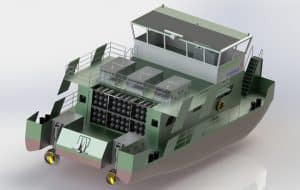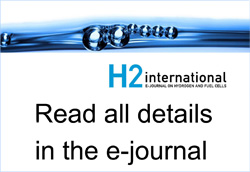The expansion of renewable energies in the transportation sector requires new types of propulsion and energy supply systems for all means of transport, as environmental hazards can have an impact on a country’s population, especially in metropolitan areas. Transportation on inland waterways shows enormous potential for improvement because today’s propulsion systems will not be able to comply with upcoming environmental regulations. Fuel cells like the ones used in the maritime demonstration project e4ships / RiverCell / ELEKTRA are proof not only of the technology’s ecological benefits compared to conventional cargo ships transporting goods on inland waterways, but also of their ability to compete on the market.
The idea of a fully electric propeller has existed since the end of the 19th century, despite the profound mistrust of rechargeable batteries at that time. Today, professor Gerd Holbach has revived the idea of all-out electric equipment within his department, Design and Operation of Maritime Systems (EBMS) at the Technical University of Berlin. The EBMS designed a towboat that covers basic propulsion and energy demand by batteries and employs a fuel cell to extend the mileage even further. The combination of battery and fuel cell is an innovation in the hybrid energy supply of maritime vessels. In cooperation with Berliner Hafen- und Lagerhausgesellschaft (BEHALA), the planned energy-efficient and hybrid-driven towboat was given the name ELEKTRA (see figure 1).
The ELEKTRA demonstration project is part of RiverCell, which in turn is part of the lighthouse project e4ships within the National Innovation Program for Hydrogen and Fuel Cell Technology (NIP). ELEKTRA has been running since July 1, 2015. The design and planning stage for the fully electric means of inland waterway transportation is said to be completed until the end of 2016, so that construction can start at the beginning of 2017. Commercial operation is scheduled for the end of 2018 in Berlin’s Western Harbor.
Task and target
The ELEKTRA that the project participants will design should push the barge URSUS, designed eight years ago by the EBMS department, and numerous project cargoes. One of the most important tasks will be the transportation of Siemens turbines, which have to be shipped from the production site in the center of Berlin to the Western Harbor or to Hamburg. But also scrap metal, coal, gravel and breakbulk of up to 1,200 tons are being transported as part of BEHALA’s daily operations in regional shipping. The implementation of this project makes it possible to establish a pioneering example of electric transportation – this time, on water – in Germany. Besides the reduction in fuel and noise emissions, ELEKTRA‘s hybrid energy supply can also contribute to meeting the agreed-upon Kyoto Protocol targets. Internal estimates point to an around 40 % reduction in CO2 emissions in inland waterway transportation across the Berlin region.
Design and specifications
Loading and refueling
…
Initial plans
The first hurdle for fully electric inland waterway transportation was the exact and practically minded design of specifications, a matter that was successfully dealt with by using extensive operation profiles of existing ships used in regional and cross-regional shipping. This stage also included analyses of energy output compared to the operational hours of similar ships. The measured data (speed, diesel consumption, motor torque), together with the information gathered by the analyses, was put into a CFD simulation, in order to forecast energy and performance at given hull specs. These forecasts resulted in weight and size specifications for the hull batteries and the fuel cell on deck. The main consideration in the calculation was the interaction between the hull’s water resistance and the integration of the batteries. This means that the different hull specifications go through the CFD simulation, prompting a change in forecast, until the last hull in the iteration loop shows an optimal balance between hydromechanics and hull space requirements. The iterative design process, however, is limited by the batteries’ space requirements.
Authors:
Professor Dr.-Ing. Gerd Holbach and Georgios Mitropoulos, both from the Technical University of Berlin
Klaus-G. Lichtfuß, Berliner Hafen- und Lagerhausgesellschaft mbH




























0 Comments